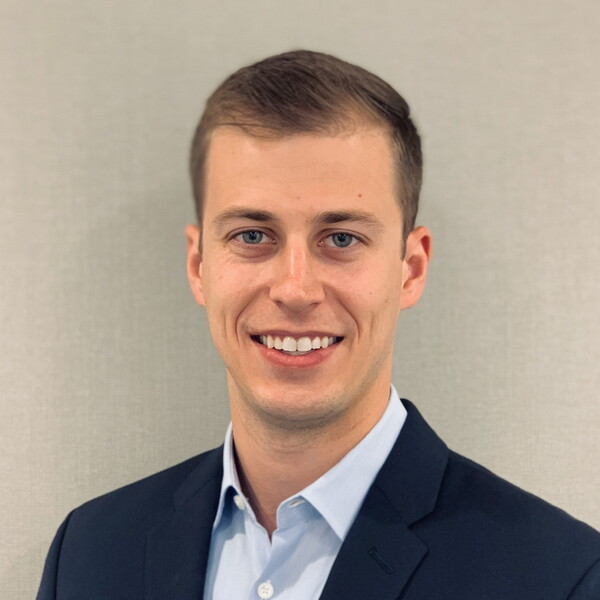Michael Shuster, Manager, Technology Partnerships and Research at Edison Electric Institute
"Besides my coworkers and the people I work with day-to-day, my FDCE Network is really the first group of people I go to with questions and problems to solve with respect to the energy industry."
- What has been unexpected during this program?
-
The on-campus week. Going into the first week, I wasn't sure what I was getting into with the program. I knew it was a pretty intensive networking and learning experience, but there was a lot of grey area until that campus week where I got to meet everyone in the cohort in person. You immediately feel like you have a network moving forward through the rest of the program, and there were a lot of really good, broad courses that made it fun. Everyone had great feedback on the first on-campus week. It really set the right tone for the rest of the program.
- How has the program built your knowledge and/or skills of clean energy?
-
I have had some roles in engineering, finance, and now policy, so I thought that I had covered a lot of material. But in that on-campus week, I learned a lot more about green banks and really became fascinated with the idea of leveraging public funds for additional private capital in clean energy technologies. This was a concept that I didn't have a lot of experience with at the time, but through the Policy course, I was able to learn a lot from a lot of my fellow participants who were working for the Connecticut Green Bank.
As an example, we had a homework assignment where we were asked to write a memo. We had the flexibility to choose our topics so I decided to further research green banks. Ultimately, I feel like I have a much better understanding of and fascination with how they bring in capital. I ended up using the final memo from our policy course to construct a letter to my County Board asking them to consider the development of a green bank in their community energy plan. It was really nice to see a real application outside of the course.
- In which ways do you believe the FDCE program has enabled you to expand your network?
-
Besides my coworkers and the people I work with day-to-day, my FDCE Network is really the first group of people I go to with questions and problems to solve with respect to the energy industry, whether it is reading an article that I don't fully understand, or needing to find out answers quickly for my day-to-day job. We have a cohort-wide group chat where people are always sending major industry news and interesting perspectives that I wouldn't have heard from my network beforehand.
- In what ways is the cohort diverse and how does that benefit your learning and/or career development?
-
For one, it is diverse in the range from analyst to directors. I feel that with six years in the industry, I am in the middle - there are some people who come to me for more experience, and there are people I can go to who have more experience than I do. That diversity is very nice. There is also a global presence, and in the U.S., there is someone in the cohort you can connect with in any major city that you might travel to for work. Being in D.C., there have been a lot of people from the cohort who have traveled here who have met up with other folks who live in the D.C. area.
- In what ways do you connect with your classmates through weekly discussions or other tools and what are the benefits of the social aspect of the program?
-
We have at least ten of us who live in the D.C. metro area, and we try to meet-up once per month for a get-together over lunch or drinks, just to socialize and talk about energy-related topics. You are able to talk to people in good detail about energy-related topics that you might not be able to with friends who aren't in the industry.
- What are the advantages of this program being online?
-
The bottom line is that there are a lot of benefits that wouldn't be feasible if the program wasn't online. Because it's online, we can have access to the Yale network of professors, alumni, and students.
- Why did you choose this program?
-
Integrating policy, technology, and finance is really attractive to me, so learning more about how to bring these together to deploy clean energy solutions was the main thing that drew me to FDCE. When I looked further into the program and saw the list of alumni and professors that were committed to teaching, that was a pretty big eye-opener for me. I knew that I wanted to compare the knowledge that I've gained through my own work with the knowledge and experiences of other people in the industry.
- Why would you recommend this program?
-
You are instantly going to expand your network across policy, finance, and technology and you are going to learn from some of the best professors and alumni in this space.
